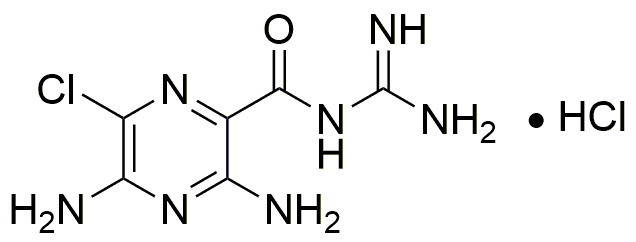Amiloride hydrochloride is widely utilized in research focused on
- Hypertension Management: This compound is primarily used as a potassium-sparing diuretic in the treatment of high blood pressure, helping to reduce the risk of heart disease.
- Heart Failure Treatment: It aids in managing heart failure by preventing excessive potassium loss, which is crucial for maintaining heart function.
- Kidney Function Studies: Researchers often use amiloride hydrochloride to study renal physiology and the mechanisms of sodium transport in the kidneys, providing insights into kidney diseases.
- Diabetes Research: The compound has been investigated for its potential role in improving insulin sensitivity and glucose metabolism, making it relevant in diabetes studies.
- Pharmaceutical Development: Its unique properties make it a valuable candidate in developing new medications targeting electrolyte balance and fluid retention issues.
Informations générales
Propriétés
Sécurité et réglementation
Applications
Amiloride hydrochloride is widely utilized in research focused on
- Hypertension Management: This compound is primarily used as a potassium-sparing diuretic in the treatment of high blood pressure, helping to reduce the risk of heart disease.
- Heart Failure Treatment: It aids in managing heart failure by preventing excessive potassium loss, which is crucial for maintaining heart function.
- Kidney Function Studies: Researchers often use amiloride hydrochloride to study renal physiology and the mechanisms of sodium transport in the kidneys, providing insights into kidney diseases.
- Diabetes Research: The compound has been investigated for its potential role in improving insulin sensitivity and glucose metabolism, making it relevant in diabetes studies.
- Pharmaceutical Development: Its unique properties make it a valuable candidate in developing new medications targeting electrolyte balance and fluid retention issues.
Documents
Fiches de données de sécurité (FDS)
La FDS fournit des informations de sécurité complètes sur la manipulation, le stockage et l’élimination du produit.
Spécifications du produit (PS)
Le PS fournit une description complète des propriétés du produit, notamment sa composition chimique, son état physique, sa pureté et les exigences de stockage. Il détaille également les plages de qualité acceptables et les applications prévues du produit.
Certificats d'analyse (COA)
Recherchez des certificats d'analyse (COA) en saisissant le numéro de lot du produit. Les numéros de lot et de lot se trouvent sur l'étiquette d'un produit, après les mots « Lot » ou « Lot de fabrication ».
Numéro de catalogue
Numéro de lot/série
Certificats d'origine (COO)
Ce certificat d'exploitation confirme le pays dans lequel le produit a été fabriqué, et détaille également les matériaux et composants utilisés et s'il est issu de sources naturelles, synthétiques ou autres sources spécifiques. Ce certificat peut être requis pour les douanes, le commerce et la conformité réglementaire.
Numéro de catalogue
Numéro de lot/série
Fiches de données de sécurité (FDS)
La FDS fournit des informations de sécurité complètes sur la manipulation, le stockage et l’élimination du produit.
DownloadSpécifications du produit (PS)
Le PS fournit une description complète des propriétés du produit, notamment sa composition chimique, son état physique, sa pureté et les exigences de stockage. Il détaille également les plages de qualité acceptables et les applications prévues du produit.
DownloadCertificats d'analyse (COA)
Recherchez des certificats d'analyse (COA) en saisissant le numéro de lot du produit. Les numéros de lot et de lot se trouvent sur l'étiquette d'un produit, après les mots « Lot » ou « Lot de fabrication ».
Numéro de catalogue
Numéro de lot/série
Certificats d'origine (COO)
Ce certificat d'exploitation confirme le pays dans lequel le produit a été fabriqué, et détaille également les matériaux et composants utilisés et s'il est issu de sources naturelles, synthétiques ou autres sources spécifiques. Ce certificat peut être requis pour les douanes, le commerce et la conformité réglementaire.

